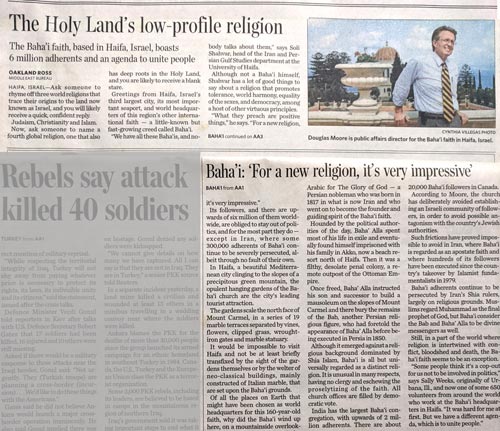
|
|
Abstract: Brief overview of the Bahá'í Faith and its place in Israel. Notes: |
The Holy Land's Low-Profile Religion
by Oakland Ross
published in Toronto Star, pages AA1, AA32007/10/22
Toronto Star Section AA WORLD & COMMENT MONDAY, OCTOBER 22, 2007 p. AA1 The Holy Land's low-profile religion The Bahá'í faith, based in Haifa, Israel, boasts 6 million adherents and an agenda to unite people OAKLAND ROSS MIDDLE EAST BUREAU |
 click for full-size image |
Judaism, Christianity and Islam.
Now, ask someone to name a fourth global religion, one that also has deep roots in the Holy Land, and you are likely to receive a blank stare.
Greetings from Haifa, Israel's third largest city, its most important seaport, and world headquarters of this region's other international faith - a little-known but fast-growing creed called Bahá'í.
"We have all these Bahá'ís, and nobody talks about them," says Soli Shahvar, head of the Iran and Persian Gulf Studies department at the University of Haifa.
Although not a Bahá'í himself, Shahvar has a lot of good things to say about a religion that promotes tolerance, world harmony, equality of the sexes, and democracy, among a host of other virtuous principles.
"What they preach are positive things," he says. "For a new religion, [page AA3] it's very impressive."
The followers, and there are upwards of six million of them world-wide, are obliged to stay out of politics, and for the most part they do - except in Iran, where some 300,000 adherents of Bahá'í continue to be severely persecuted, albeit through no fault of their own.
In Haifa, a beautiful Mediterranean city clinging to the slopes of a precipitous green mountain, the opulent hanging gardens of the Bahá'í church are the city's leading tourist attraction.
The gardens scale the north face of Mount Carmel, in a series of 19 marble terraces separated by vines, flowers, clipped grass, wrought-iron gates and marble statuary.
It would be impossible to visit Haifa and not be at least briefly transfixed by the sight of the gardens themselves or by the welter of neo-classical buildings mainly constructed of Italian marble, that are set upon the Bahá'í grounds.
Of all the places on Earth that might have been chosen as world headquarters for this 160-year-old faith, why did the Bahá'í wind up here, on a mountainside overlooking the busiest seaport of the globe's only Jewish state?
"This," replies Douglas Moore, the churches public relations director in Haifa, "is where He was a prisoner."
Moore is referring to Baha' Alla - Arabic for The Glory of God - a Persian nobleman who was born in 1817 in what is now Iran and who went on to become the founder and guiding spirit of the Bahá'í faith.
Hounded by the political authorities of the day, Baha' Alla spent most of his life in exile and eventually found himself imprisoned with his family in Akko, now a beach resort north of Haifa. Then it was a filthy, desolate penal colony, a remote outpost of the Ottoman Empire.
Once freed, Baha' Alla instructed his son and successor to build a mausoleum on the slopes of Mount Carmel and there bury the remains of the Bab, another Persian religious figure, who had foretold the appearance of Baha' Alla before being executed in Persia in 1850.
Although it emerged against a religious background dominated by Shia Islam, Bahá'í is all but universally regarded as a distinct religion. It is unusual in many respects, having no clergy and eschewing the proselytizing of the faith. All church offices are filled by democratic vote.
India has the largest Bahá'í congregation, with upwards of 2 million adherents. There are about 20,000 Bahá'í followers in Canada.
According to Moore, the church has deliberately avoided establishing an Israeli community of followers, in order to avoid possible antagonism with the country's Jewish authorities.
Such frictions have proved impossible to avoid in Iran, where Bahá'í is regarded as an apostate faith and where hundreds of its followers have been executed since the country's takeover by Islamist funadmentalists in 1979.
Bahá'í adherents continue to be persecuted by Iran's Shia rulers, largely on religious grounds. Muslims regard Muhammad as the final prophet of God, but Bahá'í consider the Bab and Baha' Alla to be divine messengers as well.
Still, in a part of the world where religion is intertwined with conflict, bloodshed and death, the Bahá'í faith seems to be an exception.
"Some people think it's a cop-out for us not to be involved in politics," says Sally Weeks, originally of Urbana, Ill., and now one of some 650 volunteers from around the world who work at the Bahá'í headquarters in Haifa. "It was hard for me at first. But we have a different agenda, which is to unite people."
|
|